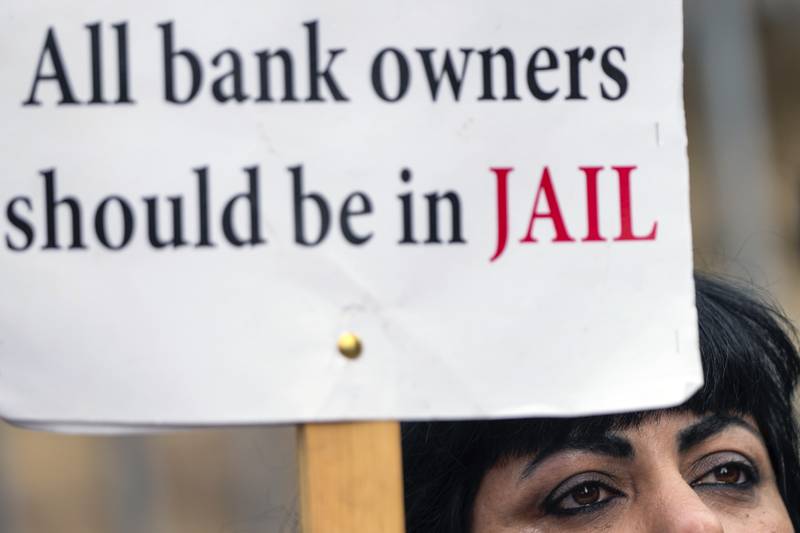By Sunniva Rose
The Belgian Parliament on Wednesday voted unanimously in favour of a resolution calling on the EU to use its sanctions framework for Lebanon for the first time.
The resolution is the first of its kind since the start of Lebanon’s financial meltdown in 2019, said Malik Ben Achour, a member of Belgium’s socialist party who introduced the bill more than two years ago.
It was adopted during a vote at the Belgian Parliament’s commission for external relations.
“It’s the first time that a parliament in Europe adopts a resolution on Lebanon calling on the EU to implement its sanctions framework,” Mr Ben Achour told The National.
“This is a strong signal of support to all those who want to fight for the rule of law in Lebanon and the independence of the judiciary.”
Mr Ben Achour visited Beirut in late September with other European officials to meet Lebanese activists, lawyers and judges.
He said he was part of an informal network of European politicians interested in Lebanon who wanted to bring attention to the country’s financial crash, which has pushed almost three quarters of the population into poverty, according to the UN.
Experts agree the crisis was man-made and was caused by decades of corruption and nepotism among Lebanon’s sectarian political class.
Adopted in July 2021, the EU’s framework for sanctions on Lebanon is designed to target those who are guilty of serious financial misconduct or obstruct the implementation of reform plans.
It remains unused as the EU focuses on the war in Ukraine and rarely discusses Lebanon.
The wide-ranging resolution adopted on Wednesday also asked the judiciary of Belgium and neighbouring countries to deepen investigations into the wealth of Lebanese officials in Europe.
It did not name the officials, but, in a tweet after the vote, Mr Ben Achour referred to Lebanon’s veteran central bank governor Riad Salameh.
“The systematic theft of the money of the Lebanese by a political-financial [mafia] must end,” he wrote.
The resolution “opens the way for European sanctions against actors (including Riad Salameh) of this “Ponzi scheme”.”
The vote in the Belgian Parliament coincided with a visit to Beirut by European investigators looking into the origins of Mr Salameh’s wealth.
They suspect him of having embezzled more than $300 million with his brother Raja through accounts in Europe.
Mr Salameh, who has rejected accusations of wrong-doing, is under investigation in Belgium, France, Germany, Luxembourg, Liechtenstein and Switzerland.
European prosecutors are for the first time looking at banking information regarding the Salameh brothers.
“It’s scandalous to see today that it’s the European judiciary that is leading the fight and making requests for judicial co-operation to the Lebanese judiciary for alleged corruption,” Mr Ben Achour told MPs shortly before the vote.
:quality(70)/cloudfront-eu-central-1.images.arcpublishing.com/thenational/3F6ELNRGDVAHRMJTAUIU5LWTQM.jpg)
“Part of the money that was stolen from the Lebanese people is in Europe, in Brussels, in Germany, in Luxemburg, in Switzerland, in France. That’s something we cannot tolerate,” said Mr Ben Achour.
Lebanese prosecutors investigating Mr Salameh have faced political pressure and defamatory media campaigns.
Mr Salameh is supported by a large number of Lebanese politicians, including Parliament Speaker Nabih Berri.
The resolution adopted by the Belgian Parliament also repeated the importance for the Lebanese government to implement reforms requested by the international community to unlock long-awaited financial aid.
The text was criticised by MP Peter de Roover, a member of the nationalist New Flemish Alliance party, who belittled its tone, claiming that it was akin to Belgium “standing in an ivory tower telling others what to do”.
“The question is: will this have much impact on the ground? We fear not” Mr de Roover said, although he voted for the text after minor amendments were made.
The resolution was being closely watched in Lebanon, said Mr Ben Achour.
He said a prominent Lebanese lawyer, Wadih Akl, travelled from Beirut to Brussels to witness the vote in person.
The National


Leave a Reply
You must be logged in to post a comment.